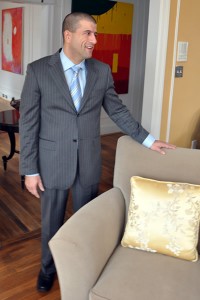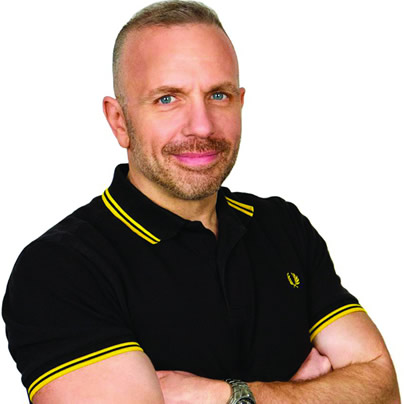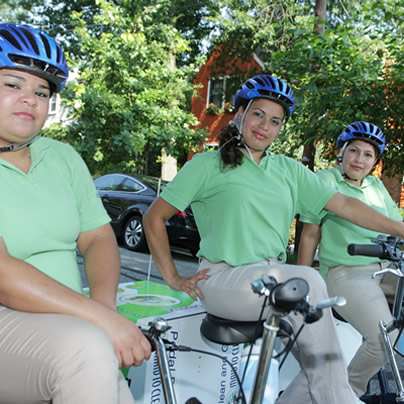Local
Local firm working toward a greener D.C.

Local gay businessman Joe Andronaco said his sexual orientation was never an issue in the workplace. (DC Agenda photo by Michael Key)
Ask someone how to save the earth from ourselves and you likely will get a range of advice. Trade your gas-guzzler in for a fuel-efficient hybrid vehicle, or better yet, an electric car. Attach solar panels to the roof of your home and use them to wean your house off of non-renewable resources. Invest in tree replanting efforts.
Local gay businessman Joe Andronaco has a less expensive, though admittedly less sexy suggestion that he says will not only have a greater collective environmental impact, but will also end up saving you money before too long: have your home inspected for energy inefficiencies, and take steps to address those inefficiencies.
“Conservation is something that doesn’t require new technologies or a major investment,” said Andronaco. And with an estimated 75 percent of the city’s carbon emissions coming from building energy use, the potential environmental benefit “is huge.”
Andronaco not only sees value in conservation, he also believes there is a good business opportunity there. Last year, he helped launch a company called Access Green, which conducts home energy audits in the greater Washington area. The company’s base product, the knowledge audit, provides homeowners with valuable information about their home – where air is coming into the house, which appliances are creating dangerous chemical emissions, and how their energy consumption stacks up against comparable dwellings, to name but a few of the items addressed in the audit.
“One of the biggest issues with green,” observed Andronaco, “is follow through. You can talk green all you want but are you going to get it done?”
For those who choose the company’s premium product, the fulfillment audit, Access Green technicians will come to your home and make some of the repairs and upgrades recommended in the knowledge audit, from changing out HVAC filters to caulking windows and doors. It is this marriage of green advice and implementation that Andronaco says sets his company apart as an innovator.
“We come with a trades knowledge to green,” said Andronaco. “We know how to practically do the things that will achieve the savings. There are lots of inexpensive, couple-hundred-dollar items that can save you thousands.”
Access Green is part of a larger corporation called USA Technologies, a $12 million business that Andronaco has led since 2003. The well-known local commercial heating and air conditioning company Argent, which received the Angie’s List Super Service Award for the past two years, is also part of USA.
“We really take a whole house approach to the way we do systems,” explained Andronaco. “Before you do something like put a new heating or air conditioning system into your home, you really need to do a whole house analysis.”
Access Green is the first company that Andronaco himself has launched, along with lawyer David Julyan and environmental lobbyist Sam Brooks, known by many locally for his spirited attempts a few years ago to win a seat on the D.C. City Council. Brooks and Julyan are principals of 360 Green, a firm that markets green knowledge and services to the business community.
Andronaco was born in Caracas to a Venezuelan mother and an American father. The family moved to Miami when Andronaco was eight and he lived there until going to the University of North Carolina at Chapel Hill to get a degree in history. He got his start in business while working for local utility giant Washington Gas. After leaving D.C. briefly to get his MBA from the Wharton School of Business, which he received with honors, Andronaco came back to D.C. and again worked for Washington Gas before leaving to pursue his dream of being an entrepreneur.
Though Andronaco has been openly gay since his days at business school, his sexual orientation isn’t something that he trumpets in the workplace. So imagine Andronaco’s surprise when his mentor, USA founder Mike Berard, an elderly, staunchly Republican, Vietnam veteran he befriended while working at Washington Gas, called Andronaco into his office to discuss Andronaco’s “lifestyle.”
“He goes, ‘I’m not going to have someone run my business and be in a closet.’ I said, ‘Mike, some people might be offended.’ He said, ‘I don’t give a shit. If they have a problem, I’ll fire them.’”
Aside from one of the company’s top salesmen expressing misgivings about how company morale would fare with a gay man in charge, a line of questioning that Berard quickly shut down, Andronaco said he has received zero negative reaction in the workplace.
“Most people thought that especially these sort of roughneck good ‘ole boy electricians and HVAC guys would have issues, but they don’t,” said Andronaco. “People are multi-faceted and you can’t take them for caricatures that are created by the media and even by ourselves.”
The 43 year old is quick to stress that being gay is just one facet of who he is, and he is extremely active in the wider community. He sits on several local boards of directors, including Goodwill and the Boys & Girls Club of Greater Washington, and is active with the Gay & Lesbian Victory Fund as well. He is also on the D.C. Mayor’s Green Collar Jobs Advisory Council and the Sustainable Energy Utility advisory board, which partners with the D.C. Council to administer sustainable energy programs. In 2008, he was recognized by the Washington Business Journal with a Greater Washington Minority Business Leader Award.
A proud D.C. resident, Andronaco lives with his partner in the Northwest neighborhood of Crestwood. Their 1925 Dutch colonial home doubles as a training and demonstration facility for his company. Earlier this week, in fact, Andronico’s colleagues at Argent used his house to demonstrate how to install programmable thermostats.
Andronaco is also a strong supporter of the city and he sees expansion of the green economy as a way to boost the District’s tax base and address its high unemployment rate. He made a conscious choice to base Access Green in the District, along the H Street corridor in Northeast, and said he likewise makes a point of hiring city residents.
Access Green conducted more than 200 home energy audits last year. According to Sara Loveland, who left her job at D.C. Greenworks last year to be Access Green’s chief operating officer, 2010 is already off to a strong start.
The company is working with the Corcoran on its green roof and recently it scored a contract with the Southern Maryland Electric Cooperative to be the sole provider of home energy audits for SMECO clients in Prince George’s and Calvert counties. They are also busy supporting legislation before the D.C. Council right now that would simplify funding options for energy efficiency improvements and renewable energy products.
“The homeowner wouldn’t have to go through a credit application as long as they have equity in their home,” explained Brooks. “If they move before the loan is paid off, it’s attached to the house and stays there. “ This is an innovative way to finance energy improvements, particularly for homeowners, that Brooks said will solidify D.C.’s place at the leading edge of the green movement.
Brooks is quick to note that this legislation is one of the rare instances where the public interest is perfectly in alignment with the interests of “green collar” businesses like his, a trend he sees continuing.
“The better a firm like ours does,” he said, “the closer the government comes to realizing its object to reduce the city’s carbon footprint.” Moreover, he added, there is opportunity here for private sector companies like Access Green to provide market-based solutions to environmental challenges, rather than rely wholly on the government for leadership.
Said Loveland: “People are so dazzled by super sexy projects like solar paneling. Not enough attention is paid to conservation. We can generate all the alternative energy we want, but without conservation we won’t achieve the results we need to meaningfully reduce our carbon footprint.”
The Access Green knowledge audit currently runs $249 while the fulfillment audit starts at $599. For more information on Access Green’s products, visit http://www.greenerhome.com or call 202-559-6061.
District of Columbia
GenOUT Chorus offers solace, strength to LGBTQ teens
Summer camp held from June 23-27

As Pride month draws to a close and Washington begins to take down its rainbow flags and WorldPride decorations, it can be easy to confine the ideas of LGBTQ liberation to June. One historic organization in Washington has been speaking out — or singing out if you will — to ensure that LGBTQ youth are allowed to explore and be themselves every month of the year.
The Gay Men’s Chorus of Washington is one of the oldest and largest LGBTQ choruses in the world. With more than 300 members and more than 40 years in the D.C. LGBTQ community, to say it is an institution would be an understatement.
Beginning in 1981, following an inspiring performance by the San Francisco Gay Men’s Chorus at the Kennedy Center, a group of 18 gay men — led by a “straight” woman and friend of Washington’s gay community, Marsha Pearson — created the GMCW. Since its establishment the organization has only grown in number and relevance within the city. From hosting multiple concerts a year, international equality trips, and creating a dedicated space to “inspire equality and inclusion with musical performances and education,” the GMCW is one of the cornerstone organizations in the Washington LGBTQ community.
One of the most remarkable parts of the GMCW is its youth outreach program and choir: GenOUT. The outreach ensemble specializes in providing a space for Washington’s LGBTQ and allied youth, ages 13-18, to find their voice through song and connect that voice to community. The GenOUT program has been around since 2001, and since 2015 has provided a platform for their voices to be heard — literally — making it the first LGBTQ youth chorus in the Washington area.
The Washington Blade sat down with GenOUT Director C. Paul Heins and member Ailsa Ostovitz to discuss why GenOUT, and more specifically the GenOUT summer camp, which was held from June 23-27, has become an essential space for LGBTQ youth in the D.C. area to find their voice amid less-than-supportive administration and rising anti-LGBTQ rhetoric in the nation.
“This is my 11th season with GenOUT, and also the 11th season with Gay Men’s Chorus of Washington,” Heins said when explaining how he ended up in the director role for the self-selected, no audition required youth outreach ensemble. “I was hired in August of 2014 to start GenOUT. I spent that first fall researching other choruses, figuring out the infrastructure, promoting the chorus, and building relationships with schools, organizations, and faith communities. And then we started in January of 2015 with nine brave singers and since then, we’ve had 150+ singers from 80 or more schools in the DMV participate.”
Ailsa Ostovitz, on the other hand, being in high school had not had as much experience with choirs — yet her commitment and unwavering passion for the work she — and the other performers within GenOUT provide to each other was unmistakable.
“I’ve been a part of the course since April of 2022, and that was like seventh grade— which is wild to think about,” Ostovitz said when reflecting on how long she had been a part of GenOUT. She explained how she had begun to develop a drive for filling leadership roles within GenOUT after gaining valuable experiences and education from the organization.
“This is my first year in leadership,” she added. “The rest of the years, I kind of hung back. I really wanted to — especially last season — kind of put myself in the position of a peer and think ‘What would I want from people that are supposed to represent me to the adults? What would I want out of that?’”
And with those questions in mind, Ostovitz explained she buckled down and worked hard to get to where she is now as a member of the leadership team within the GenOUT choir.
“I spent a lot of time working with my section leader, and, looking up at him and being like, ‘What are you doing now that I can do in the future?’ And so this year, I ran for leadership,” Ostovitz said. “I got section leader, and that was cool. I’ve just spent a lot of time — most of my time in this course — learning leadership skills to kind of help me in all sorts of things in life, because I like to take control of things, and I like doing stuff.”
These leadership skills are just a handful of the things that students like Ostovitz learn while participating in the program. This year’s theme was “Make Them Hear Us!: Empowering LGBTQ+ and Allied Youth Through Music, Media, and Community,” and provided multiple opportunities for GenOUT’s members to engage with new concepts, ideas, and experiences.
From field trips to mentoring opportunities to an end-of-camp performance, it becomes clear when speaking to those familiar with the GenOUT experience: it is not your traditional summer day camp.
“The title of the camp references the anthem that GMCW has sung for many years,” Heins said. “‘Make Them Hear You’ from the musical ‘Ragtime’ encourages us to share important stories — stories that honor the fights that we’ve been fighting, the rights that we have won, affirmations that we seek for every human being, and the focus on media — specifically developing young people’s understandings of the kinds of media that they can access and use to share their voice.”
The camp offers singing and dancing lessons, creative writing exercises, LGBTQ+ history lessons, and open discussions about identity — providing an outlet for students to figure out who they want to be and find their voice.
“What this camp does, I believe, is it helps foster young people’s voices and not only encourages them to speak, but to give them the skills to speak in a way that will be heard meaningfully,” Heins added. “I have noted that youth in queer choruses like GenOUT have said that singing in a chorus allows young people to express themselves more honestly and with greater passion than other forms of expression. They’ve also said that singing with others that understand you on a very deep, profound level, makes the expression much easier and more beautiful. I think that experience is what really makes this a special opportunity for young, LGBTQ and allied people.”
Ostovitz echoed Heins’s sentiment, emphasizing that the space GenOUT provides allows her to feel empowered in ways more than by creating leadership skills that will help her later in life. GenOUT has allowed for her to see the humanity and similarities LGBTQ youth all face in a straight world.
“Joining the chorus and being in this camp, it really gives people a chance to see that every person is going through the same experience you are, on a level of finding your own identity and being confident in that,” Ostovitz said. “It really, really serves a purpose by showing there are still queer people. They’re not fizzling out — young people are queer. We want to use our voices to express what we feel and how things are affecting us, and I think that using music to do that is probably one of the most powerful ways to do that.”
In addition to allowing for internal growth and honing their singing abilities, both Ostovitz and Heins pointed out the other valuable skills students learn while in the GenOUT program. Ostovitz explicitly highlighted the mentorship program GenOUT has with GMCW, and how it has helped students like her figure out their future.
“Because we are so connected with GMCW, we run a mentorship program where, if you want to explore career, identity, whatever, we can connect you with somebody from GMCW,” Ostovitz said. “You get to spend a whole semester with a person working on your voice or your career or your what you want to do in higher education. It’s not only for things related to your queer identity, but it’s also just for life. It’s really cool.”

This year’s theme, centering around media and the many ways people can share their voice, was highlighted through the camp’s field trips to two legacy media organizations — WAMU and NBC Washington — and a discussion with staff from the Washington Blade, including Publisher Lynne Brown and International News Editor Michael K. Lavers.
“GenOUT provides a chance to get to know people from all around this area, but it also connects you to older folks, It connects you to people from the past, as well as we learn about LGBTQ history,” Heins said. “I think a camp specific thing is we want young people to understand how they can share their stories beyond just talking to their friends. There are these forms of media that are out there to share your stories, to have your voices heard, and to have a sense that these media are there for everyone. It’s not just a thing for people aged 21 and over. That was something that Lynne and Michael from the Blade were sharing with; that anyone can write in a letter to the editor. It doesn’t mean it’s going to be published, but that anyone has that opportunity. And I think that’s a great way for them to say the Blade is open to you to share your voice.”
The concept that there are people who want to, or may need to hear queer voices represented is one that is not lost on Ostovitz.
“There is something Thea says that has kind of integrated into our chorus — that someone out there needed to hear you, needed to hear your voice, needed to hear your story,” Ostovitz said. “That’s something that I kind of live by in this chorus, where I’m like, ‘I believe that there is someone out there that needed to hear this song for whatever reason, whatever it did for them. And I’m hoping to learn how much more can this chorus do for not just our little community, but how much more can it do around the world or the country — especially now.”
Living in the political center of the U.S., Ostovitz explained, has impacted how she approaches her identity, her education, and the urgency of using her voice — both as a student and as a young queer person navigating an increasingly hostile national climate.
“Being so close to the political center of the country and also a student at the same time has not been the easiest thing in the world as of late,” she said. “You’re thinking a lot about ‘Oh, I wonder if this program in my school will still exist next year,’ because a lot of the funding for physics and science programs in general has been cut. So I’m fortunate enough that Maryland has been pretty good about going against this administration. And so being in this chorus gives me a second to step back from my academics and just go somewhere for the two hours of rehearsal.”
For Ostovitz, just having those two short hours a week to focus on music — without thinking about the political climate that paints her and her choir peers as nefarious for being LGBTQ — provides solace.
“Everybody else is going through the same thing as I am, but we’re all also working towards the same goal, which is acceptance and uplifting of everybody and everyone — no matter who they are,” she said. “It kind of settles you down and grounds you. And then you just make music with people, and it’s really like a stress reducer for me.”
“Is it too trite to say that that would make people feel less alone, knowing that it’s not just a DMV thing, but that there are queer people all over?” Heins asked Ostovitz.
“No, it’s not — for sure,” Ostovitz responded. “It was a bit eye-opening.”
“A lot of us are fortunate enough to have families that support us enough to trust us and help us be passionate and mean what we do with the work that we do in this chorus — because it is optional,” Ostovitz added. “It is optional to have the courage that we have to practice and commit as much as we do, and the fact that we have a whole organization backing us on that is pretty cool.”
“We often say that we sing for those who can’t sing in a chorus like ours,” Heins said. “We sing for people who don’t have the freedom or the option to live their authentic lives. I think that’s very powerful.”
“It’s a very unique experience to be surrounded by so many people that get it,” Ostovitz said. “It’s a very joyful experience when we perform our big shows at the Lincoln Theater, being part of that production is also a very unique experience. So I think everything about this chorus is very joyfully unique.”
“I feel very proud, and I feel very inspired,” Heins said. “I feel inspired by the young voices. I feel a sense of inspiration in my own music-making, when I am able to take a piece from its very beginning all the way to the stage in a polished form. And I feel that sense of pride in knowing that I’ve helped this group of young people develop their confidence to do really amazing things.”
“GenOUT sang 22 times last year, which for any chorus is a big deal, but for a youth chorus coming from thither and yon, it is really a big deal,” Heins added. “I’m just really inspired and proud, and know that when I am in a nursing home somewhere and these folks are still out working and I know the country will be in good hands.”
Virginia
Walkinshaw wins Democratic primary in Va. 11th Congressional District
Special election winner will succeed Gerry Connolly

On Saturday, Fairfax County Supervisor James Walkinshaw won the Democratic primary for the special election that will determine who will represent Virginia’s 11th Congressional District.
The special election is being held following the death of the late Congressman Gerry Connolly, who represented the district from 2008 until 2024, when he announced his retirement, and subsequently passed away from cancer in May.
Walkinshaw is not unknown to Virginia’s 11th District — he has served on the Fairfax County Board of Supervisors since 2020 and had served as Connolly’s chief of staff from 2009 to 2019. Before he passed away, Connolly had endorsed Walkinshaw to take his place, claiming that choosing Walkinshaw to be his chief of staff was “one of the best decisions I ever made.”
The Democratic nominee has run his campaign on mitigating Trump’s “dangerous” agenda of dismantling the federal bureaucracy, which in the district is a major issue as many of the district’s residents are federal employees and contractors.
“I’m honored and humbled to have earned the Democratic nomination for the district I’ve spent my career serving,” Walkinshaw said on X. “This victory was powered by neighbors, volunteers, and supporters who believe in protecting our democracy, defending our freedoms, and delivering for working families.”
In addition to protecting federal workers, Walkinshaw has a long list of progressive priorities — some of which include creating affordable housing, reducing gun violence, expanding immigrant protections, and “advancing equality for all” by adding sexual orientation and gender identity to the Fair Housing Act.
Various democratic PACs contributed more than $2 million to Walkinshaw’s ad campaigns, much of which touted his connection to Connolly.
Walkinshaw will face Republican Stewart Whitson in the special election in September, where he is the likely favorite to win.
Maryland
LGBTQ suicide prevention hotline option is going away. Here’s where else to go in Md.
Changes will take effect July 17

By ANNA RUBENSTEIN | The national suicide prevention hotline will no longer offer specialized support to LGBTQ people, starting July 17, the Trump administration announced last week.
Dialing the hotline at 988 will still be available for crisis support. But callers will no longer be able to reach specific LGBTQ services by pressing Option 3. The change worries advocates because their data shows the LGBTQ community has a disproportionally high suicide rate.
Even after the option ends, here’s how to receive tailored support if you’re in Maryland.
The rest of this article can be found on the Baltimore Banner’s website.

















